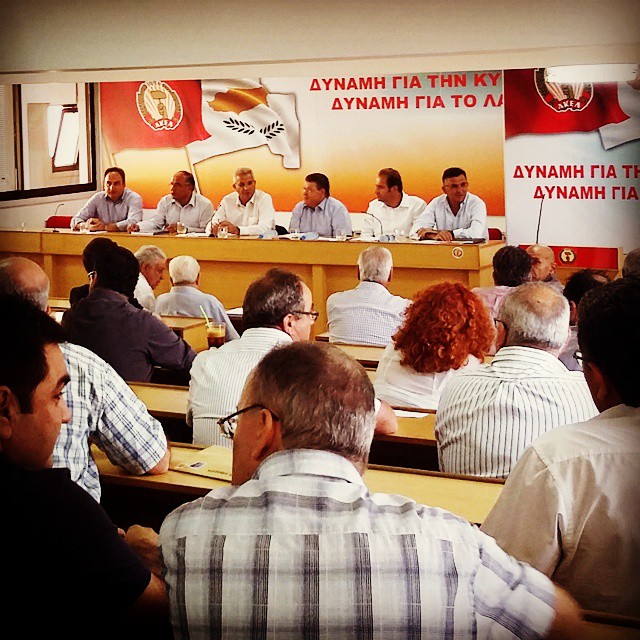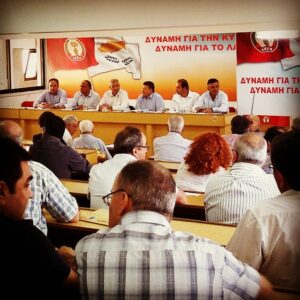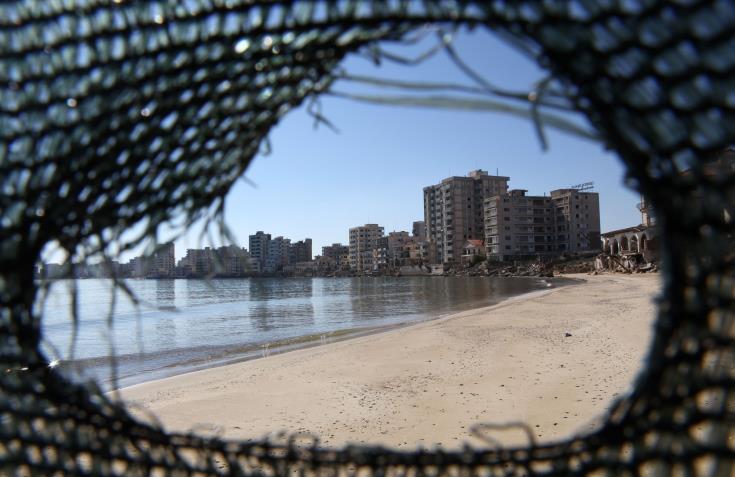
Statement of the Central Committee of AKEL on the Cyprus Problem
Saturday 29th November 2014, Nicosia
 The Central Committee of AKEL in its plenary session today discussed at length the latest negative developments surrounding the Cyprus problem and the issue of natural gas. The C.C. considers that the situation that has been created as a result of Turkey’s provocative actions within the Exclusive Economic Zone (EEZ) of the Republic of Cyprus is extremely worrying and demands an immediate and effective response. It is imperative that everyone reflects seriously as to what should be done, far from any display of emotions and petty-party considerations and expediencies.
The Central Committee of AKEL in its plenary session today discussed at length the latest negative developments surrounding the Cyprus problem and the issue of natural gas. The C.C. considers that the situation that has been created as a result of Turkey’s provocative actions within the Exclusive Economic Zone (EEZ) of the Republic of Cyprus is extremely worrying and demands an immediate and effective response. It is imperative that everyone reflects seriously as to what should be done, far from any display of emotions and petty-party considerations and expediencies.
Despite its substantial disagreements with the policy implemented by President Anastasiades, AKEL all through this period was restrained in its reactions, putting the emphasis on submitting constructive proposals rather than exerting criticism, in an effort to convince the President of the Republic to revert to the correct line of policy.
At present, however, the situation has reached a breaking point. We are in immediate danger of finding ourselves confronted with the painful dilemma either of the collapse of the negotiation procedure or its continuation with the issue of natural gas being put on the table. If the former were to occur, the only feasible way for a solution of the Cyprus problem would be terminated, with the possible triggering of partitionist options. If the latter were to occur, it would mean the suspension of the Republic of Cyprus’ rights of sovereignty or their joint exertion with the Turkish Cypriot community before the solution of the Cyprus problem. The recent interview given to the Cyprus Broadcasting Corporation by the United Nations Secretary-General’s Special Adviser on the Cyprus problem Espen Barth Eide is indicative of this danger. Furthermore, natural gas would cease being an incentive for a solution, with a real danger of it being turned into a disincentive. Faced with these terrifying dilemmas, AKEL cannot follow developments passively, nor can it accept AKEL being held jointly responsible for all that will subsequently follow.
Immediately after the assumption of the Presidency by Nikos Anastasiades, as AKEL, disregarding the political cost, we were vigorously pointing out that the Christofias-Talat convergences must be reaffirmed and that the talks should continue from where they had left off. In addition, AKEL was also warning of the consequences of the government’s policy of negotiations from scratch/zero. Developments themselves have proved we were right:
First, we warned that the attempt to replace the Christofias – Talat joint communiques with the drawing up of a new communique was unnecessary and erroneous. The result was the barren five months wasted time, which resulted in a joint communique with losses: The indivisibility of sovereignty was lost, the term “constituent states” was agreed and the residual power was granted to them. Although last two do not constitute matters of principle, they were not however previously granted by our side for negotiation purposes.
Second, an equally unnecessary procedure of investigating both side’s positions (screening) subsequently followed. AKEL warned that the guaranteed result of this procedure would be the widening of the gap between the two sides. It is generally acknowledged that this is precisely what happened.
Third, instead of substantive negotiations a procedure of submitting documents with each side’s positions followed, which merely reconfirmed the widening of the gap.
Subsequently, and since all the discussions about what should be done in relation to the convergences were ending in a stalemate, with the Greek Cypriot side not accepting them and Mr. Eroglu claiming that he supposedly accepts them whereas he had previously rejected them and in essence led the talks to a deadlock since the beginning of 2012, a new procedure was decided: namely to bypass the issue of the convergences, to discuss the pending key issues and pursue a “give-and-take” procedure. This procedure is problematic since for the pending issues to be discussed what has been agreed must previously be defined. It is therefore very likely that the procedure will encounter problems from the very outset, with disagreement with regards the definition of the pending core issues. Furthermore, how will we enter afterwards into a “give-and-take” procedure given the gap that exists in the issues that were bypassed? We have to note that much better procedural ideas were also tabled which, unfortunately, were rejected. However AKEL, despite its reservations, supported the procedure that was agreed, since otherwise we would have arrived at a procedural impasse.
When everything was ready for the start of the substantive phase of the negotiations, Turkey’s unacceptable action to designate the southern areas of the Exclusive Economic Zone of the Republic of Cyprus and indeed opposite the free coasts and to send there the frigate Barbaros for research inevitably led to a suspension of the negotiation procedure. AKEL backed the decision taken by the President of the Republic, but at the same time stressed that suspension does not also mean a termination of the negotiation procedure, which is the only available way to find a solution of the Cyprus problem.
Of course the responsibility for the tension lies exclusively with Turkey. However, the fact that the occupying power has moved from the issuing of threats in the past to the actions it is taking today makes it very difficult for it to retreat in a disorderly fashion. To address the real danger of the collapse of the negotiation procedure or of its resumption with the natural gas issue on the table, it is imperative that the President of the Republic takes initiatives; initiatives that do not constitute a withdrawal from the position that we do not discuss under threats, nor do we accept the discussion the issue of natural gas before the solution of the Cyprus problem.
AKEL submitted to the Council of the Heads of Parties a concrete package of proposals with which, without in any way consenting to a discussion of the natural gas issue before the solution of the Cyprus problem, our good will is demonstrated and an opportunity is provided to Turkey to end its provocations and resume the negotiation procedure. If Turkey does not do so, at least the pressures must be directed towards it. The package of proposals included talks with Turkey after the solution of the Cyprus problem on the delimitation of the EEZ between the two states, as well as provision of natural gas to it. In addition, this package also included a reaffirmation of the convergences concerning the maritime zones, natural resources and the allocation of federal revenues.
Unfortunately, AKEL’s proposal was not adopted, with the responsibility lying with the President and the remaining the political forces. Even the aforementioned convergences were not sufficiently brought to the fore, even though they reply convincing to all the concerns presented by Turkey and the Turkish Cypriot leadership, not because they are considered unacceptable, but on the argument that if we reaffirm them we will be called upon to accept the other convergences as well.
The President of the Republic must review his one-sided foreign policy and take initiatives and not simply declare that he will not enter into talks while Turkey’s provocations are continuing. This is correct, but insufficient. The gravity of the situation demands that the difficult but salutary path of responsibility is pursued. If petty-political considerations prevail, AKEL is not prepared to be held jointly responsible for the disastrous consequences. We have demonstrated enduring patience and AKEL gave more than enough period of grace. There is no longer any room for periods of grace. Of course we recognize the right of the President of the Republic to have the final say. This however means at the same time that the President himself and nobody else will assume the sole responsibility for all that will follow. We hope that the interests of the country and people will prevail, even at the last minute.




